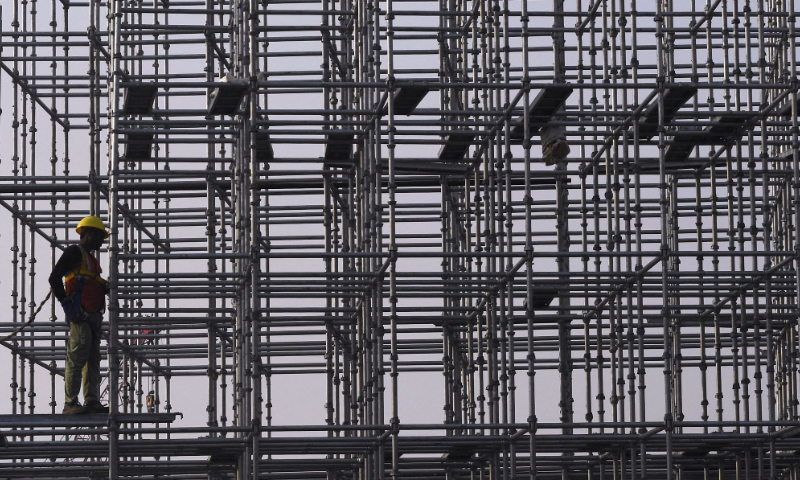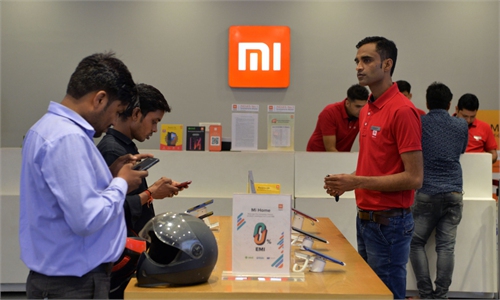
A worker fixes bolts on a steel scaffolding at a construction site for the upcoming coastal road project in Mumbai on January 3, 2022. Photo: VCG
In the next five years, India may overtake Germany and Japan to become the third-biggest economy in the world, according to the International Monetary Fund (IMF) World Economic Outlook database, India media outlets reported.
The optimistic sentiment toward India's economy was buoyed when India overtook the UK as the fifth-largest economy in the last quarter of 2021. India is likely to become the third-largest economy in the world by 2029, a State Bank of India (SBI) research report forecast in September.
Just a decade ago, India's GDP was the 11th largest in the world. Now, with 7 percent growth forecast for 2022, India has reasons to be optimistic about its economic growth. But it will not be an easy task for the country to maintain the growth rate, especially amid global economic gloom, as historic data shows that it is a hard task for a country to maintain a growth rate above 7 percent for a long time.
There is no shortage of voices in India urging caution about its economy. Congress MP Shashi Tharoor said in September that the country should not get "carried away" by reports the Indian economy had become the fifth largest in the world, as challenges from the country's sizeable population remain a concern.
India's hidden concerns in its economy include a relatively low per capita GDP, sluggish manufacturing progress and large trade deficits. For instance, media reported that India's trade deficit widened to a record $30 billion in July. India obviously needs to boost its manufacturing and exports. There is no question that if India wants to realize its economic ambitions, it still has a long way to go, and it should attach more importance to the quality of its economic development.
In order to boost its economy, India needs to expand opening up instead of holding on to protectionism, and it should deepen participation in regional cooperation. In addition, India should avoid falling into the geopolitical gaming pit that the West digs for it and avoid viewing economic cooperation with other countries with a zero-sum mindset.
As India has become the fifth-largest economy in the world, the US and Western media outlets have started another round of hype that India is expected to receive production relocation from China. In addition, the West is trying to lure India into their geopolitical tools designed to exclude China from industrial chains, like the US-led Indo-Pacific Economic Framework (IPEF) and Quad.
However, India seems to understand that the West's plan is to involve India in geopolitical gaming rather than providing real support for it to boost manufacturing and economic growth. For instance, India recently chose to stay out of the trade pillar, one of the four pillars of the IPEF, as the plan failed to provide benefits for India.
It should be noted that China is willing to see India to carry out economic cooperation with other countries based on equality and mutual benefits. But India should realize that its development needs Asian industrial and supply chains. Only by deepening economic cooperation with regional economies can India achieve continuous growth.
The author is a reporter with the Global Times. bizopinion@globaltimes.com.cn



